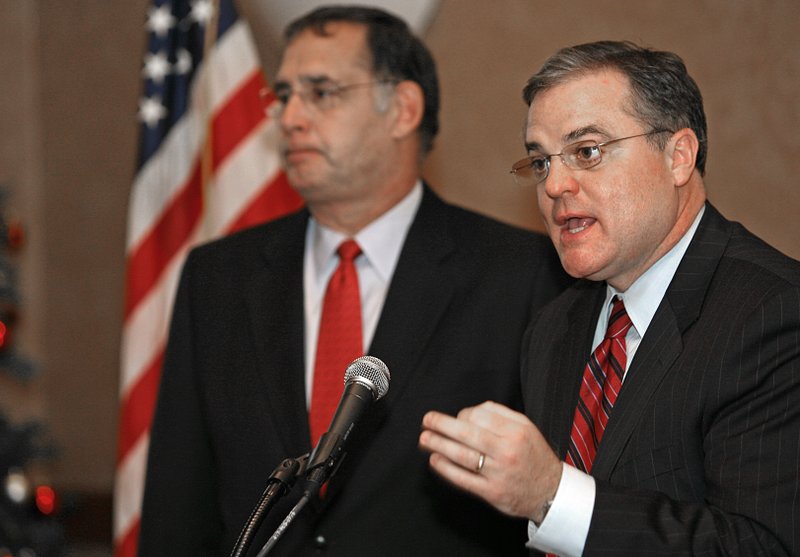WASHINGTON — WASHINGTON - Despite a highly charged political climate in the U.S. Senate, the partisan divide does not extend, for now, to the two senators - one from each party - who represent Arkansas.
Sen. Mark Pryor, a Democrat, and Sen. John Boozman, a Republican, speak about each other in glowing terms.
“John Boozman is very capable,” Pryor said. “He’s very likable, and I think that’s a good combination around here.”
Boozman returned the compliment, saying that Pryor was always supportive of projects that helped the state’s 3rd District when Boozman represented it in the House.
“That partnership will extend statewide,” he said, adding that Pryor has been “very helpful in the transition.”
Arkansas is represented by one Democrat and one Republican senator for the first time since Democrat Blanche Lincoln and Republican Tim Hutchinson served between 1997-2003.
Same-state senators from different parties often get along better than senators from the same party, according to Wendy Schiller, a Brown University professor and author of Partners and Rivals: Representation in U.S. Senate Delegations.
“They’re not competing for the same fundraising base, and they’re not competing for electoral support,” she said. “They’re completely in different spheres so they don’t have to knock each other down all the time. They can afford to work together and share the credit.”
Schiller predicted the two Arkansans would get along largely because Pryor is a conservative Democrat who has demonstrated a willingness to work with Republicans in the chamber.
Last week started with a bipartisan display from Boozman and Pryor.
On Monday, the two senators wrote to Secretary of Commerce Gary Locke, urging him to keep in place trade duties on imported Chinese candles. Any change in the current rules, they said, would harm small candle companies, including Hanna’s Candle Company in Fayetteville.
On Tuesday, the two say, they traded e-mails regarding a Pryor amendment in a broader aviation-policy bill. Pryor’s measure would cap the local cost-sharing requirement for contract air traffic towers, including the Rogers Traffic Control Tower.
Because he is in the major-ity and has direct access to the Democratic leadership’s legislative strategy, Pryor was able to report to Boozman that his amendment was likely to be included in the larger bill.
Boozman called Pryor’s effort on the issue “invaluable.”
Meanwhile, Boozman had spoken with fellow Republicans on the Senate Judiciary Committee, helping secure their support for P.K. Holmes, an Obama administration nominee to be U.S. district judge for the Western District of Arkansas. Holmes’ nomination cleared the committee Thursday.
On Thursday, the two senators attended the National Prayer Breakfast, an event they’ve both been involved with over the years.
Their “common faith” is a “personal connection that has helped strengthen our friendship,” Pryor said. “I don’t know if that translates into politics or policy.”
Even as the two worked on state issues and prayed together, their policy disagreements came into focus in early Senate action when they split votes on an unsuccessful Republican effort to repeal the health-care overhaul that passed last year.
Boozman voted for repeal, Pryor did not.
Often, as in the case of the two Nevada senators, Senate Majority Leader Harry Reid, a Democrat, and Sen. John Ensign, a Republican, same-state senators from different parties reach a “nonaggression pact.”
The two have enjoyed a good working relationship since Reid beat Ensign by 430 votes in a 1998 runoff election, according to David Damore, a politics professor at University of Nevada Las Vegas.
Despite the fact that Reid, as majority leader, is the personal target of Republican opposition in the chamber, Damore said Ensign has declined to attack him personally.
And though Ensign is battling a stubborn ethics scandal, “Reid hasn’t said a peep.”
On occasion, Ensign has pushed back against Reid’s legislative initiatives, and he played the part of the majority leader when candidate Sharron Angle (who unsuccessfully challenged Reid last year) prepped for debate.
But, “for the most part, they’ve tried not to cross swords,” Damore said.
That has a lot to do with Ensign’s ethics investigation, which prompted his resignation from Senate Republican leadership in 2009, according to Damore.
“If he had remained in leadership, you would have had tensions.”
Sometimes two senators’ personalities can cause friction.
Nebraska Republican Chuck Hagel and Democratic Sen. Ben Nelson served together until Hagel decided to retire in 2009.
Their relationship, already rocky after a close election in 1996 in which Hagel prevailed, became “dysfunctional” when Nelson joined Hagel in the Senate in 2001, according to Loree Bykerk, a politics professor at University of Nebraska at Omaha.
Bykerk said the two did not support each other’s earmarks- the individual spending items senators try to bring to their states - and that they often seemed to be “at cross purposes.”
“Both members and their staffs participated in a tit-for tat,” she said. “It was really pretty petty.”
Hutchinson, the last Arkansas Republican to serve in the Senate before Boozman, predicted Boozman and Pryor would have political differences but would get along because they share mild temperaments.
“Neither are flamboyant,” he said.
During the four years he and Lincoln served together, the two offered competing bills on a variety of issues and, on occasion, attempted to strike each other’s legislative language from bills during floor debates.
Hutchinson noted that he and Lincoln revived a long dormant practice among Arkansas senators of issuing joint press releases.
In a statement, Lincoln said: “I thoroughly enjoyed my working relationship with Tim Hutchinson in both the U.S. House and the U.S. Senate. I considered him a friend while we served together and still consider him a friend today.”
The biggest obstacle to a closer working relationship is building a level of trust between the two staffs, Hutchinson said. “Staffs really want to protect their bosses and give their bosses credit.”
Reflecting on the 2002 senate race that he lost to Pryor, Hutchinson said that level of trust can erode when elections loom closer.
“It’s almost inevitable.”
Front Section, Pages 1 on 02/07/2011
